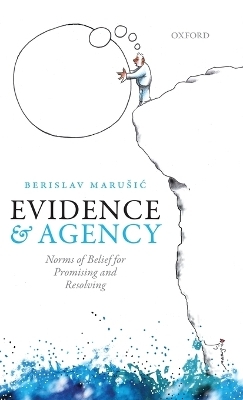
Evidence and Agency
Norms of Belief for Promising and Resolving
Seiten
2015
Oxford University Press (Verlag)
978-0-19-871404-0 (ISBN)
Oxford University Press (Verlag)
978-0-19-871404-0 (ISBN)
Berislav Marušić explores how we should take evidence into account when thinking about future actions, such as resolving to do something we know will be difficult. Should we believe we will follow through, or not? He argues that if it is important to us, we can rationally believe we will do it, even if our belief contradicts the evidence.
Evidence and Agency is concerned with the question of how, as agents, we should take evidence into account when thinking about our future actions. Suppose you are promising or resolving to do something that you have evidence is difficult for you to do. For example, suppose you are promising to be faithful for the rest of your life, or you are resolving to quit smoking. Should you believe that you will follow through, or should you believe that there is a good chance that you won't? If you believe the former, you seem to be irrational since you believe against the evidence. Yet if you believe the latter, you seem to be insincere since you can't sincerely say that you will follow through. Hence, it seems, your promise or resolution must be improper. Nonetheless, we make such promises and resolutions all the time. Indeed, as the examples illustrate, such promises and resolutions are very important to us. The challenge is to explain this apparent inconsistency in our practice of promising and resolving.
To meet this challenge, Berislav Marušić considers a number of possible responses, including an appeal to 'trying', an appeal to non-cognitivism about practical reason, an appeal to 'practical knowledge', and an appeal to evidential constraints on practical reasoning. He rejects all these and defends a solution inspired by the Kantian tradition and by Sartre in particular: as agents, we have a distinct view of what we will do. If something is up to us, we can decide what to do, rather than predict what we will do. But the reasons in light of which a decision is rational are not the same as the reasons in light of which a prediction is rational. That is why, provided it is important to us to do something we can rationally believe that we will do it, even if our belief goes against the evidence.
Evidence and Agency is concerned with the question of how, as agents, we should take evidence into account when thinking about our future actions. Suppose you are promising or resolving to do something that you have evidence is difficult for you to do. For example, suppose you are promising to be faithful for the rest of your life, or you are resolving to quit smoking. Should you believe that you will follow through, or should you believe that there is a good chance that you won't? If you believe the former, you seem to be irrational since you believe against the evidence. Yet if you believe the latter, you seem to be insincere since you can't sincerely say that you will follow through. Hence, it seems, your promise or resolution must be improper. Nonetheless, we make such promises and resolutions all the time. Indeed, as the examples illustrate, such promises and resolutions are very important to us. The challenge is to explain this apparent inconsistency in our practice of promising and resolving.
To meet this challenge, Berislav Marušić considers a number of possible responses, including an appeal to 'trying', an appeal to non-cognitivism about practical reason, an appeal to 'practical knowledge', and an appeal to evidential constraints on practical reasoning. He rejects all these and defends a solution inspired by the Kantian tradition and by Sartre in particular: as agents, we have a distinct view of what we will do. If something is up to us, we can decide what to do, rather than predict what we will do. But the reasons in light of which a decision is rational are not the same as the reasons in light of which a prediction is rational. That is why, provided it is important to us to do something we can rationally believe that we will do it, even if our belief goes against the evidence.
Berislav Marušić is Associate Professor in the Department of Philosophy at Brandeis University. He received his PhD from the University of California, Berkeley in 2007 and his AB from Harvard in 2001. His work lies at the intersection of epistemology and ethics, and he is especially interested the relationship between practical and theoretical reason, the nature of reasons, existentialism, and skepticism.
Introduction ; 1. Promising and Resolving against the Evidence ; 2. Sincerity and Rationality ; 3. The Non-Cognitivist Response ; 4. The Practical Knowledge Response ; 5. The Evidentialist Response ; 6. The Sartrean Response ; 7. Trusting against the Evidence ; Conclusion ; Postscript ; Glossary ; References ; Index
| Erscheint lt. Verlag | 8.10.2015 |
|---|---|
| Verlagsort | Oxford |
| Sprache | englisch |
| Maße | 153 x 223 mm |
| Gewicht | 450 g |
| Themenwelt | Geisteswissenschaften ► Philosophie ► Erkenntnistheorie / Wissenschaftstheorie |
| Geisteswissenschaften ► Philosophie ► Ethik | |
| ISBN-10 | 0-19-871404-1 / 0198714041 |
| ISBN-13 | 978-0-19-871404-0 / 9780198714040 |
| Zustand | Neuware |
| Haben Sie eine Frage zum Produkt? |
Mehr entdecken
aus dem Bereich
aus dem Bereich
die Grundlegung der modernen Philosophie
Buch | Softcover (2023)
C.H.Beck (Verlag)
18,00 €
Buch | Softcover (2023)
Reclam, Philipp (Verlag)
7,00 €

![Was heißt Denken?. Vorlesung Wintersemester 1951/52. [Was bedeutet das alles?] - Martin Heidegger](/media/113619842)
